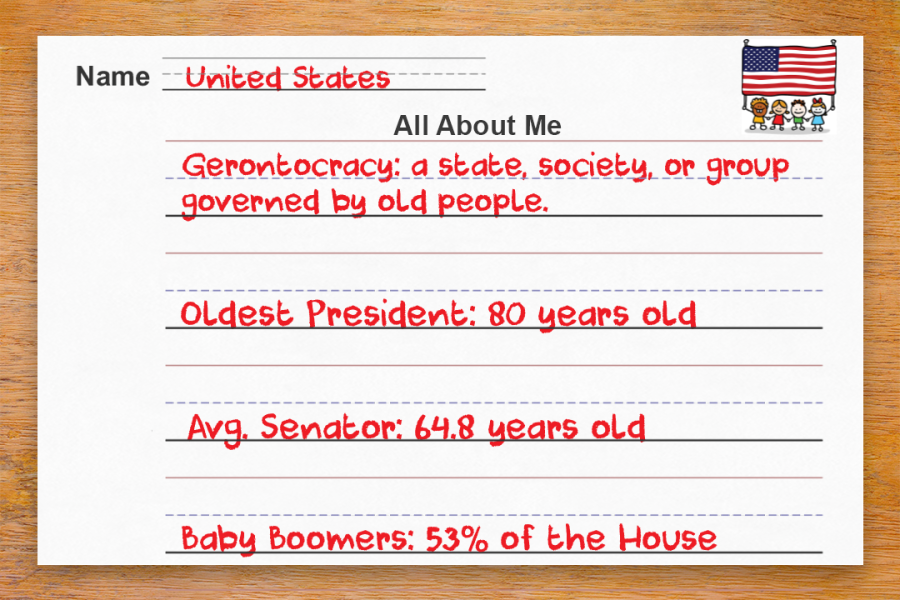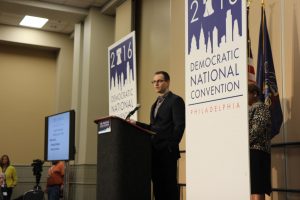Out With the Old Officials
Electing younger representatives is the only way to make sure that Gen Z’s interests are also taken into account
December 7, 2022
With a democracy that moves at a leisurely pace, it’s no surprise that most of the current leaders of our country emerged from a generation cautious of change.
Born between 1946-64 and into the sweeping wave of McCarthyism, the baby boomers were indoctrinated with a sense of self-reliance that only increased with age. While their work ethic is inspiring, for younger generations eagerly waiting to take their place, it’s also selfish.
At 80 years old, U.S. President Joe Biden is the oldest person to ever serve in the role. Although many question the sharpness and rigor an 80-year-old man can muster, it’s often argued that wisdom comes with age, and that seems to be a necessary qualification to serve in office. Biden’s predecessor, former U.S. President Donald Trump, was the second oldest president at their inauguration at the age of 70, and ever since, there has been a growing speculation that America is a gerontocracy.
The age of our elected representatives is rising, and many young people are concerned that older representatives cannot adequately advocate for their needs.
The 2022 midterm elections saw high participation rates from Gen Z, with many voting in consideration of issues such as gun violence, climate change and reproductive rights. It seems like Gen Z is motivated by candidates tackling certain issues. Nearly one in eight voters in this midterm election were under 30 and more than half supported Democratic candidates.
Baby boomers make up 53% of the House and 68% of the Senate. The median age of senators in the current session is 64.8 years old, a slight increase from the previous session which was 63.6 years old. The age of our elected representatives is rising, and many young people are concerned that older representatives cannot adequately advocate for their needs. While age does not automatically determine a person’s political affiliation, younger people tend to be more liberal while older people are often more conservative.
One notable exception is the current Supreme Court, which is younger and more right-leaning than previous years. Although the Supreme Court is not as old on average as it has been in the past, the life terms served by justices allow them to stay on the bench for longer than they should.
When liberal justice Ruth Bader Ginsburg was on the court, she chose not to step down under the Obama administration. She passed away at the end of the Trump administration, which led to the appointment of Justice Amy Coney Barrett. Barrett eventually voted to overturn Roe v. Wade, which Ginsburg likely would not have supported.
Ginsburg’s refusal to step down dented her pristine legacy, as many thought her choice was selfish. However, it doesn’t invalidate the milestones she crossed while in office and exemplifies the work ethic her generation is renowned for demonstrating. Many older Americans grew up valuing themselves based on their work performance, and it’s impossible not to carry that mindset throughout life, which is why many of them postpone retirement as long as possible.
While the average age of our government is skewed high, change might be just on the horizon. House Speaker Nancy Pelosi, 82, recently announced her plan to step down from her position, ending her two-decade streak as one of the top Democrats in Congress. Eager to fill big shoes, Democrats put forward Reps. Hakeem Jeffries of New York, Katherine Clark of Massachusetts and Pete Aguilar of California to take her place, all three of whom range within the Gen X demographic. Fresh, young faces will hopefully be better equipped to represent younger Americans.
The problem with boomers dominating public office is that many won’t live to see the outcome of the laws they pass, but younger generations will.
Boomers were once considered radical youth who led the Civil Rights Movement and protested against the Vietnam War. They swarmed the stages of Woodstock and ditched class to see the Beatles. They were reckless and unyielding and fought tooth and nail to protect democratic freedoms that were once at stake. So for a generation once revered as great, why are they now being ridiculed by younger generations?
Is it a rite of passage to have a rival between generations that occurs every other decade? Or could it be that boomers grew up with access to opportunities that are scarcely available now? Back then, housing was cheaper, college was more affordable, and working hours were more flexible. Boomers took advantage of those benefits, and now, many of them fail to realize how unattainable they’ve become.
The problem with boomers dominating public office is that many won’t live to see the outcome of the laws they pass, but younger generations will. So when they vote against things that young people demand, such as protecting reproductive rights, climate action and expanding civil rights, many are frustrated with their lack of representation in office.
Boomers serve with wisdom which has enabled them to make decisions based on past experiences. However, we’re living in a time period very different from the ones they’ve lived through. We must support young people in their efforts to gain substantive representation so that our government actually answers to us.














